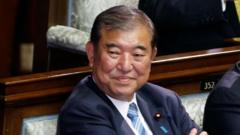**Rahm Emanuel's impact as Ambassador to Japan has sparked varying opinions on the extent of his influence in reshaping the country's military policies amidst a traditionally consensus-driven culture.**
**Emanuel's Diplomacy: Igniting Japan's Military Policy Reform**

**Emanuel's Diplomacy: Igniting Japan's Military Policy Reform**
**How the US Ambassador to Japan Influenced Significant Changes in Defense Strategy**
In a political landscape often characterized by careful deliberation and slow consensus, Rahm Emanuel, the United States Ambassador to Japan, has sparked significant discussions about his role in the country's rapid defense policy transformation. Emanuel, who has held a variety of prominent political positions, expresses a sense of urgency in decision-making that contrasts sharply with the Japanese national ethos.
A self-described impatient figure, Emanuel has reframed how the U.S. and Japan interact, especially regarding military spending and capability. Notably, Japan has dramatically increased its military budget and secured advanced weaponry like Tomahawk missiles since his tenure. Emanuel reflects on this sudden shift, suggesting that Japan was on the verge of change before he arrived but credits his influence for hastening these developments.
Despite Emanuel's confident assertion of his contributions, Japanese decision-makers highlight the national government's autonomy in implementing these policies. Former Prime Minister Fumio Kishida acknowledges Emanuel's advisory role but emphasizes that it was ultimately Japan's decision-making process that drove these strategic changes.
This divergence in perspective on Emanuel's impact raises crucial questions about foreign influence in domestic policy. Some analysts argue that his assertive style has helped Japan assert greater military independence amidst regional security concerns, while skeptics caution against attributing too much credit to a foreign envoy in a deeply ingrained system of consensus politics.
Emanuel's departure from traditional diplomatic subtleties continues to evoke mixed reactions as Japan navigates its role in an increasingly complex international landscape, suggesting that his tenure may have long-lasting implications for U.S.-Japan relations.
A self-described impatient figure, Emanuel has reframed how the U.S. and Japan interact, especially regarding military spending and capability. Notably, Japan has dramatically increased its military budget and secured advanced weaponry like Tomahawk missiles since his tenure. Emanuel reflects on this sudden shift, suggesting that Japan was on the verge of change before he arrived but credits his influence for hastening these developments.
Despite Emanuel's confident assertion of his contributions, Japanese decision-makers highlight the national government's autonomy in implementing these policies. Former Prime Minister Fumio Kishida acknowledges Emanuel's advisory role but emphasizes that it was ultimately Japan's decision-making process that drove these strategic changes.
This divergence in perspective on Emanuel's impact raises crucial questions about foreign influence in domestic policy. Some analysts argue that his assertive style has helped Japan assert greater military independence amidst regional security concerns, while skeptics caution against attributing too much credit to a foreign envoy in a deeply ingrained system of consensus politics.
Emanuel's departure from traditional diplomatic subtleties continues to evoke mixed reactions as Japan navigates its role in an increasingly complex international landscape, suggesting that his tenure may have long-lasting implications for U.S.-Japan relations.





















